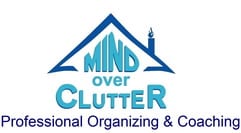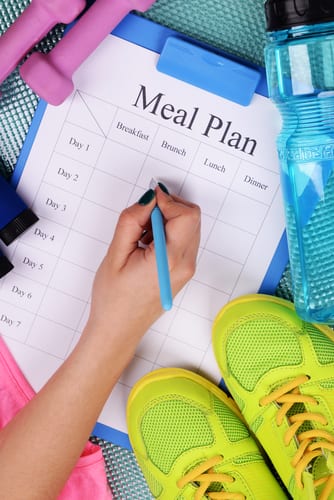5 Organizing myths
People have preconceived ideas about what it means to be organized. Being organized means you can find what you are looking for in a reasonable amount of time. The myths about being organized are what stop people from moving forward and organizing their lives. Here is the fallacy in 5 myths.
Myth 1 Organizing is a born talent
Organization is a skill. You can learn techniques to apply to your situation to get you organized. If you have the right resources and support it is easy. Hire a Professional Organizer, read books, watch Youtube and you can learn the steps. Some tasks at home can be simplified so they are not so overwhelming and time-consuming. Here is one small example about meal planning.
- Pick your menu for the week
- From the menu make your shopping list
- Now you don’t need to decide what to make each morning or evening and you can take out of the freezer the items you need for later in the day.
- After you have done this for a number of weeks or months you can start recycling your plan. This makes it even easier as you just pull up an already completed menu plan.

Myth 2 – Organized space is neat, tidy, minimal and boring.
Everything needs to have a space, a home, so you know where to put it back. Some people are visual and will have things displayed other people like things stored behind doors. Organized spaces should reflect your personality and lifestyle. If you can’t enjoy the space then you won’t take care of it.
Myth 3 – Getting organized is an overwhelming, hopeless chore
No matter what you’re organizing, no matter how daunting the task or how huge the backlog is, getting organized boils down to developing a predictable process that you can reproduce. You follow your process and organize the current things you are using and then each time you’re organizing, work for a little time on the backlog. Divide the job into smaller tasks, organize one cupboard, one drawer, one table or one closet. Eventually, the entire room will be organized one small step at a time.
Myth 4 – It’s impossible to stay organized
Organizing is sustainable if your system is built around the way you think and designed to grow and adapt with you. Here are some tips:
- If it only takes 30 seconds, do it right away if not add it to your to-do list
- Most unorganized people don’t notice things are in the “wrong place.” Look and do a mental check to see if everything has been returned to its assigned space.
- Use spare minutes wisely. Have a list of small tasks that can be completed quickly when you are waiting for meetings, appointments, trains, planes, children, and elderly parents.
- Use your lists to record: things to do, to call, to e-mail and errands. Check the list don’t just write it down.
Myth 5 Organizing is a non-productive use of your time
You can’t afford to not be organized. A national survey conducted by Professional Organizers in Canada indicates 91% of disorganized Canadians feel that disorganization negatively impacts their lives – with a large focus on feelings of stress, frustration and even failure. According to a study by a Boston marketing firm, the average American loses 55 minutes a day, roughly 12 weeks a year, looking for things they know they own but can’t find.
Did I miss any organizing myths? Share your favourite myth in the comments.
 Julie Stobbe is a Trained Professional Organizer and Lifestyle Organizing Coach who brings happiness to homes and organization to offices, coaching you virtually using Zoom. She has been working with clients since 2006 to provide customized organizing solutions to suit their individual needs and situations. She uses her love of physical activity to reduce clutter, in your home, office, mind and time. If you’re in a difficult transition Julie can coach you to break-free of emotional clutter constraining you from living life on your terms. Get started by downloading Tips for Reorganizing 9 Rooms.
Julie Stobbe is a Trained Professional Organizer and Lifestyle Organizing Coach who brings happiness to homes and organization to offices, coaching you virtually using Zoom. She has been working with clients since 2006 to provide customized organizing solutions to suit their individual needs and situations. She uses her love of physical activity to reduce clutter, in your home, office, mind and time. If you’re in a difficult transition Julie can coach you to break-free of emotional clutter constraining you from living life on your terms. Get started by downloading Tips for Reorganizing 9 Rooms.
Contact her at julie@mindoverclutter.ca
X – Facebook – Facebook group Organizing Mind and Space




Here’s one: There is only one way to get organized. We are all unique, and what works for me might not work for you.
That is a good myth too. Many organizers are now marketing a system. If someone is going to “buy” a system make sure it suits your needs. Instead, if you work with a Trained Professional Organizer they should be able to develop a system to suit your personality and lifestyle.
+
How about, “I need to get a lot of products to get organized?”
Very good myth. Some clients are worried that the products needed will be expensive and some clients seems to like the product purchases best. I always tell them that comes last and you can use what you have.
I totally agree that we are not born with organizing genes. Like reading, organizing is a skill that you can learn. However, unlike reading, the system and process used are flexible for each person to remember it best. Thank you for taking the time to share this post.
Once people understand organizing is a skill they feel less afraid that something is “wrong” with them. They realize they can learn the steps and gain confidence in doing so.
I LOVE this post, Julie! It’s amazing how many assumptions people have about getting organized. It’s these “myths” that can prevent people from reaching out for help. So, clarifying how you did it will help those who might need help to understand how it can be possible.
The stats you shared are incredible. And it supports the idea that getting organized is valuable and can help in so many ways- less frustration, less stress, more productivity—all great results.
Organizing is incredibly valuable and once you start organizing parts of your life it is easier to understand that. When you’re in the middle of disorganization you only be able to see how much work needs to be done and not the value at the end of the journey. Believe in the facts not the myths.
I loved that you covered some of the BIG organizing myths. These are the ones upon which we can all agree, as opposed to the ones we debate, like the OHIO (only handle it once) rule, or the value of color coding. I can’t even pick my favorite, because everything you’ve spelled out is so vital. And organizing can be boring, but only if you want it to be! (Or maybe I just think that because I crack jokes during my organizing sessions.)
Thanks for your comment. Thanks for mentioning 2 more myths. I agree organizing can be fun and full of joy and laughter.
Organization is definitely a skill – and one that really evolves over time too I think. What worked for me in my 20’s definitely doesn’t still work for me in my 40’s! ;-).
Yes, organizing changes with time. I try to tell my clients they can’t find the perfect system and then be done. The system needs to change and adapt to their life
Thanks for posting this. I feel it is important that our clients realize that this can be a learning experience. I always tell them that, yes, it is easier for some people to learn organizational skills than others – all can learn. I am not artistic, and I have a hard time learning languages, but it is not impossible for me to learn.
I think the key to learning the skill is wanting to. The motivation needs to be there. I always use the comparison that I can learn to build a website but do I want to. That is why we have clients, some want to learn the skills and others want us to do the work.
Organizing is one of those tasks that is overwhelming in theory, but once you start doing it, you see how it provides some many benefits to your life.
Thank you for the comment. It is a cost-benefit equation. Desire to conquer overwhelm vs the benefits to your life.